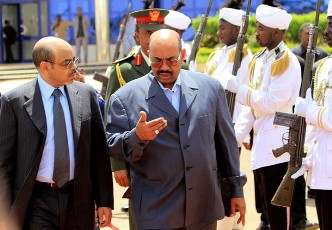Ethiopia denies advising US to overthrow Sudan’s government
September 15, 2011 (KHARTOUM) – The Ethiopian government has disputed allegations that its Prime Minister Meles Zenawi advised the US Administration that toppling the Sudanese government of president Al-Bashir is the “preferred option” for Washington.

In the talks, which focused on the widely expected issuance of an arrest warrant against Bashir by the International Criminal Court (ICC) on charges of war crimes he allegedly committed in Sudan’s western region of Darfur, Zenwai reportedly said that Washington should consider two options in dealing with Khartoum.
The first one, which he clearly conveyed as the preferred choice according to the US cable, would be to “remove the Bashir regime.”
Acknowledging that such an option was unlikely, Zenawi advocated for making a clear representation to the Khartoum that the United States is not “out to get them” and laying out clear benchmarks of actions expected of the government on both Darfur and South Sudan that would be necessary to “avoid continued challenges” with the US.
In a press release issued on Saturday, Addis Ababa said that the Wikileaks cable seems to suggest that the former US ambassador in Ethiopia informed Washington that the Ethiopian PM spoke with the US officials about the necessity of overthrowing Khartoum’s government.
The release strongly denied these allegations, saying that in the contrary, the full text of the release shows that Zenawi counseled Washington that the option of toppling Al-Bashir’s government was not appropriate.
Addis Ababa went on to say that Zenawi had actually advised the US administration to devise clear proposals to persuade Khartoum to overcome challenges with South Sudan and Darfur.
The press release laid stress on Addis Ababa’s firm position that the responsibility to change any government of a sovereign country rests solely on the people of that country and not on any foreign powers.
It went on to allege that Zenawi told US officials during the talks that Washington should not appoint itself as an alternative to the Sudanese people who are the only party entitled to change the government.
“The Ethiopian government acknowledges that any attempt to topple the government would yield a negative effect not only on Sudan also on the entire region,” Addis Ababa said.
According to the leaked cable, Zenawi argued that the ruling party in Sudan is disappointed over US refusal to normalise ties despite signing the 2005 Comprehensive Peace Agreement (CPA) that ended more than two decades of civil war with the South.
At the time, Washington promised Khartoum that it will normalise ties as a reward. However, the conflict in Darfur made the US hesitant to do so amid intense domestic pressure to take action that would reverse the growing humanitarian crisis in Sudan’s western region.
“While the [Government of Sudan] GoS thought that they had moved away from a climate of bad relations with Washington when they signed the Comprehensive Peace Agreement in Naivasha, they perceive the United States as having shifted the goal posts on them since” Zenawi said.
As a result, Zenawi asserted that the GoS believes that “the U.S. will get them one way or the other,” and from that perspective, they are already in a corner. “Believing they will lose, they perceive no benefit to them of resolving the problems of South Sudan”, the Ethiopian top official said.
Zenawi said that the NCP’s strategy as a result will be to deploy delaying tactics such as postponing the January 2011 referendum, buy time on Darfur and “hope for a miracle” in 2011. South Sudan’s self determination did go ahead in January resulting in a massive vote for independence, which it achieved in January. Sudan was the first country to recognise South Sudan’s secession.
“To die today or die tomorrow, they will choose to employ delaying mechanisms allowing them to die tomorrow” Zenawi explained.
He said that while the “Islamic agenda” may have motivated the regime ten years ago, today they are interested only in money and power.
He pressed the case that direct negotiations between Khartoum and Washington could lead to rational discussions.
(ST)
